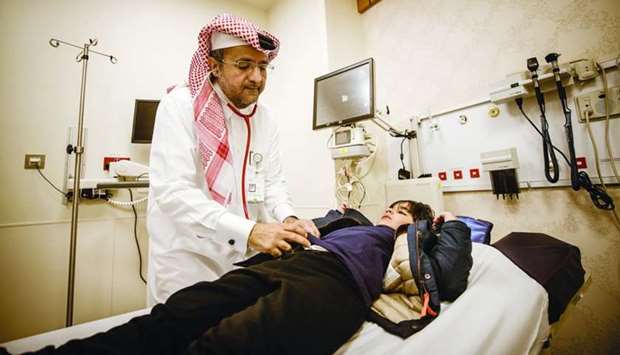Sidra Medicine has partnered with Hamad Medical Corporation’s Paediatric Emergency and other stakeholders, to host the Qatar-Paediatric Emergency Medicine (Q-PEM) conference, the fourth edition of which concludes Sunday.
“Unlike adult emergencies, children’s emergency care services are often more complex, and need an approach where multiple specialists are involved simultaneously,” said Dr Khalid Mohamed Abdulla al-Ansari, chair of Paediatric Emergency Medicine at Sidra Medicine.
Conference topics range from sensory-friendly emergency departments, customer service in the emergency department, and food allergies in 2020, to anti-epileptic drugs, updates on head injuries, the use of nerve blocks for pain management, and trauma care.
“When this conference was first initiated a few years ago, one of the priorities was that the event should help the entire spectrum of specialists involved in paediatric emergency medicine – from surgeons and physicians, therapists and technicians, to emergency medical technicians and social workers,” said Dr al-Ansari, adding that the areas Q-PEM will focus on exemplify what Sidra Medicine, a member of Qatar Foundation offers the wider community.
“Given the fact that globally, paediatric emergency medicine as a specialised field has been around for barely 20 years, Sidra Medicine has been able to offer Qatar a comprehensive facility in a relatively short time,” explained the physician, who is also professor of Clinical Paediatrics at Weill Cornell Medicine-Qatar.
He says that, in Qatar, emergency cases previously had to be categorised and sent to specialised emergency departments that dealt with a specific trauma or illnesses.
Children who suffered from allergic reactions, fever, gastroenteritis or pneumonia, for instance, would be treated at a specific emergency department, while those who sustained fractures, wounds that required suturing and burns were treated in another emergency facility.
“Since Sidra Medicine opened, children with any emergency condition can be treated under one roof,” says Dr al-Ansari.“This means that sick children who require a mix of surgical and medical intervention and even psychological counselling, have access to such expertise and do not have to be moved to another facility.
“Additionally, such children, their parents or their caregivers have access to allied health care workers such as dieticians, therapists and social services, again, all in the same hospital.”
The benefits of access to such comprehensive paediatric emergency healthcare are being felt by the entire community; Sidra Medicine receives around 40-50 emergency cases by ambulance each day, with another 200-250 young patients arriving by public or private transport.
The majority of paediatric emergency cases are referred by other healthcare facilities in the country, both public and private.
The Q-PEM conference explores numerous pathways that, collectively will help the medical fraternity across the world deliver comprehensive care in their respective communities.
“However, what we can do is to share our expertise, our experiences, and our results with others, providing centres that do not offer specialised facilities with the knowledge to initiate their own protocol.
“This is why, rather than localising the conference, we opened it to an international audience. And the response has been tremendous; the last few conferences have each seen up to 600 attendees sign up, evidence that healthcare professionals are keen to learn more about the best way to treat children,” he added.
Conference topics range from sensory-friendly emergency departments, customer service in the emergency department, and food allergies in 2020, to anti-epileptic drugs, updates on head injuries, the use of nerve blocks for pain management, and trauma care.
“When this conference was first initiated a few years ago, one of the priorities was that the event should help the entire spectrum of specialists involved in paediatric emergency medicine – from surgeons and physicians, therapists and technicians, to emergency medical technicians and social workers,” said Dr al-Ansari, adding that the areas Q-PEM will focus on exemplify what Sidra Medicine, a member of Qatar Foundation offers the wider community.
“Given the fact that globally, paediatric emergency medicine as a specialised field has been around for barely 20 years, Sidra Medicine has been able to offer Qatar a comprehensive facility in a relatively short time,” explained the physician, who is also professor of Clinical Paediatrics at Weill Cornell Medicine-Qatar.
He says that, in Qatar, emergency cases previously had to be categorised and sent to specialised emergency departments that dealt with a specific trauma or illnesses.
Children who suffered from allergic reactions, fever, gastroenteritis or pneumonia, for instance, would be treated at a specific emergency department, while those who sustained fractures, wounds that required suturing and burns were treated in another emergency facility.
“Since Sidra Medicine opened, children with any emergency condition can be treated under one roof,” says Dr al-Ansari.“This means that sick children who require a mix of surgical and medical intervention and even psychological counselling, have access to such expertise and do not have to be moved to another facility.
“Additionally, such children, their parents or their caregivers have access to allied health care workers such as dieticians, therapists and social services, again, all in the same hospital.”
The benefits of access to such comprehensive paediatric emergency healthcare are being felt by the entire community; Sidra Medicine receives around 40-50 emergency cases by ambulance each day, with another 200-250 young patients arriving by public or private transport.
The majority of paediatric emergency cases are referred by other healthcare facilities in the country, both public and private.
The Q-PEM conference explores numerous pathways that, collectively will help the medical fraternity across the world deliver comprehensive care in their respective communities.
“However, what we can do is to share our expertise, our experiences, and our results with others, providing centres that do not offer specialised facilities with the knowledge to initiate their own protocol.
“This is why, rather than localising the conference, we opened it to an international audience. And the response has been tremendous; the last few conferences have each seen up to 600 attendees sign up, evidence that healthcare professionals are keen to learn more about the best way to treat children,” he added.

